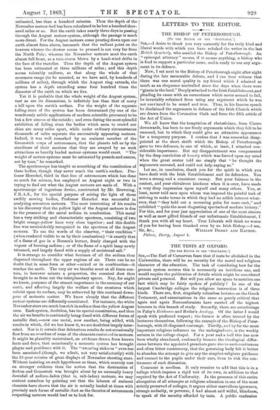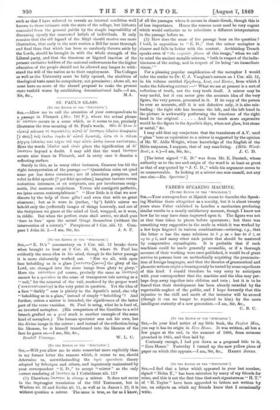THE TESTS AT OXFORD.
[TO THE EDITOR OF THE "SPECTATOR."] SIR,—The Earl of Carnarvon fears that if teats be abolished in the Universities, there will be no security for the moral and religious character of the education. The task of considering how far the
present system secures this is necessarily an invidious one, and would require the publication of details which might be considered private and personal. But will you allow me space to mention one fact which may be fairly spoken of publicly ? In one of the largest Cambridge colleges the religious instruction is of three kinds. There are, first, singularly colourless lectures on the Greek Testament, and examinations in the same so purely critical that again and again Nonconformists have carried off the highest honours in this branch of study. Secondly, there are catechizings in Paley's Evidences and Butler's Analogy. Of the latter I would speak with profound respect ; the former is often treated by the lecturers themselves, following the example of the Bishop of Peter- borough, with ill-disguised contempt. Thirdly, and by far the most important religious influence on the undergraduate, is the weekly sermon in the college chapel. For a year and a half this has now been wholly abandoned, confessedly because the theological differ- ences between the appointed preachers gave rise to such continuous and often bitter controversy, that the governing body felt it better to abandon the attempt to give any the simplest religious guidance and counsel to the pupils under their care, than to risk the con- tinuance of such dissension.
Comment is needless. It only remains to add that this is in a college which imposes a rigid test of its own, in addition to that required by the Act of Uniformity. In the presence of this entire abnegation of all attempts at religious education in one of the most strictly preserved of colleges, it argues either marvellous ignorance, strange audacity, or perverse, I had almost said wilful, blindness, to speak of the security afforded by tests. A public confession such as that I have referred to reveals an internal condition well known to those intimate with the state of the college, but hitherto concealed from the general public by the simple impossibility of discussing openly the unavowed beliefs of individuals. It only remains that the old legend of the. Sibyl should receive one more illustration, that early in the next session a Bill far more thorough and final than that which has been so carelessly thrown aside by the Lords, should be brought in with the whole strength of the Liberal party, and that the timorous or bigoted inaction of the present exclusive holders of the national endowments for the higher education of the people should not be allowed any longer to with- stand the will of the nation as to their employment. The Colleges as well as the University must be fully opened, the abolition of theological teats must be compulsory, not permissive ; above all, we must have no more of the absurd proposal to make the present state tenfold worse by establishing denominational halls.—I am,































 Previous page
Previous page